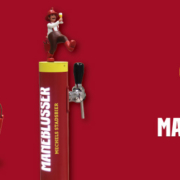“if you want to live, eat bread and drink beer, as it’s being said traditionally in this country”
It is known that with this verse, the Sumerians honored Ninkasi, “the Lady who fills the mouth” and also the goddess of beer. Clay tablets of thousands of years BC, with odes to beer in cuneiform script, show us how important this drink was for Babylonian and Sumerian culture. And this is big deal, because barley and its derivatives like beer (very different from what we know today), was one of the main sources of nutrients in times when filling the basket in the supermarket was still science fiction. As a matter of fact, even wages were paid with beer!
We will tell you the history of beer other day. Today, though, we want to emphasize the following: did you know that beer is owed to women? It is true that beer was the result of chance, like many other products that are part of our gastronomy, but once the process of cereal fermentation and production of the drink was discovered, it was women who became experts In the matter, a field practically exclusive throughout generations.
For the Egyptians, beer remained as important as gold. Even the symbols of the hieroglyph referred to the meal were a beer jar and a loaf of bread. At this time, beer was still a women’s thing. We owe the Egyptian women the malting of the barley. In addition, they were in charge of making this restorative drink during military expeditions.
In times of the Roman Empire, we still talk about beer focusing from a female angle. According to Roman mythology, Ceres was the goddess of agriculture, crops and fertility. Both “cereals” and “beer” have their roots in “Ceres”. In the Middle Ages and now focusing on the communities of northern Europe, women continue to lead the brewing production. During these times, beer culture also expands, because the Scandinavians (a.k.a. Vikings) impelled European and intercontinental commerce. In the Middle Ages, the production of beer was also common in monasteries, since they kept the knowledge and with that, they kept old beer recipes that they put into practice. Thanks to the great Hildegarda de Bingen (abbess, writer, scientist and composer), we have the first written references to the use of hops.
The beer became a real drink and the real thing… No one would take the beer from breakfast to Queen Elizabeth I of England! However, what really was beer for centuries was the economic engine of many European families, driven by women. The Industrial Revolution meant that women would take second place in the industrial production of beer.
After all this walk through the history of women and beer, it’s time to raise the jars and make a toast.










 ISO 9001:2015 Certificate
ISO 9001:2015 Certificate Quality Policy
Quality Policy

Leave a Reply
Want to join the discussion?Feel free to contribute!